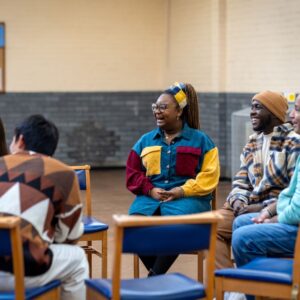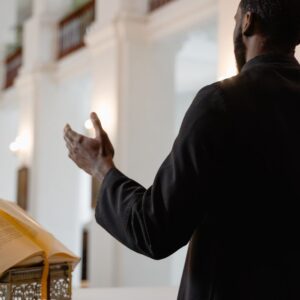The American church stands at a crossroads. Political polarization has reached unprecedented levels, with 43% of clergy reporting their church is somewhat or very divided, a jump from 25% in 2021. The Religious Landscape Studies show a substantial decline in the percentage who describe themselves as Christians, including declines in all three major Protestant traditions (evangelical, mainline and historically Black Protestant churches). Yet in this moment, we are called to remember what we have always been meant to be: communities of healing, justice, and transformative love.
The Lost Connection Between Faith and Justice
Social justice and community work should be synonymous with the church. This is not a radical statement, but a return to a foundational calling. As Jesus announced his ministry in Luke 4, he proclaimed good news to the poor, freedom for prisoners, recovery of sight for the blind, and release for the oppressed. Rather than a merely spiritual metaphor, his words provided a concrete vision of God’s kingdom breaking into the world through communities of faith.
Yet somewhere along the way, many churches began to see justice work as optional, political, or even dangerous, as they created false separations between “spiritual” and “social” concerns. This divide didn’t happen overnight. Over decades, particularly in American evangelicalism, a theology emerged that prioritized individual salvation while treating systemic issues as secondary concerns. The gospel became primarily about personal relationship with Jesus, with less emphasis on the communal and societal transformation that marked the early church.
This separation intensified during the 20th century as churches grappled with rapid social change. Some retreated into purely spiritual concerns to avoid controversy, while others became so identified with particular political movements that their prophetic voice was compromised. The result has been a church that often speaks eloquently about personal morality while remaining silent about structural injustices like poverty, racism, and inequality.
Consider the early church described in Acts 2 and 4, where believers held all things in common, sold their possessions to care for those in need, and ensured no one lacked basic necessities. These weren’t optional charitable activities but expressions of what it meant to follow Jesus together. The early Christians understood that their faith demanded both personal transformation and communal action for justice.
When we divorce faith from justice, we end up with a truncated gospel that fails to address the fullness of human need, and create congregations focused inward while the world around them struggles with housing insecurity, food deserts, educational inequity, and systemic discrimination. This disconnect explains why many younger generations perceive the church as irrelevant to their deepest concerns about the world they’re inheriting.
The “Social Gospel” Pushback: Understanding the Fear
To move forward authentically, it’s important to acknowledge why some Christians and churches resist social justice engagement. The term “social gospel” has become weaponized, carrying baggage from early 20th-century theological debates that continues to shape contemporary conversations.
The social gospel movement of the early twentieth century sought to redirect Christians away from future-facing eternal life and toward peace and justice in the present. Regeneration came to be articulated mostly in terms of social justice rather than peace with God and neighbor. Critics argued this approach minimized individual salvation and the centrality of Christ’s atoning work.
Conservative evangelicals express concern that values borrowed from secular culture undermine scripture in the areas of race and ethnicity, manhood and womanhood, and human sexuality under the broad rubric of concern for “social justice”. The false social gospel conflated the gospel with social justice, making the good of justice overtake the greater good of evangelism.
These concerns, while sometimes expressed in ways that dismiss legitimate justice work, point to a real tension: How do we engage social issues without losing the transformative power of the Gospel? The answer lies not in choosing between personal salvation and social action, but in understanding them as inseparable expressions of God’s love.
Read more about Faith in Actions: Responding to Injustice
Denominational Approaches: Learning from Our Traditions
Different Christian traditions have historically approached social engagement in distinct ways, offering various models for contemporary churches to consider.
Methodist Heritage: Methodists emphasize the role of grace in salvation and the importance of community service, leading to a strong focus on social justice initiatives. Methodists tend to approach social issues with progressive sensibilities, emphasizing social justice and human rights. The Wesleyan tradition offers eschatological realism and optimism, understanding God’s political image on each person, providing a distinctly Wesleyan political theology that assumes societies, like persons, can move towards perfection while remaining tempered by eschatological realism.
Baptist Autonomy and Diversity: Baptists have historically emphasized the separation of church and state and local church autonomy, which can lead to diversity in social and political views. This congregational governance model allows for varied approaches to social engagement, from conservative churches that focus primarily on individual transformation to progressive congregations deeply involved in community organizing.
Catholic Social Teaching: Pope Leo XIII in 1891 in the encyclical Rerum Novarum critiqued both socialism and unfettered capitalism, emphasizing the right to property, the justice of fair wages, the right to unionize, and the mediating role of the state, serving as a foundation for Catholic Social Teaching that addresses human dignity and the common good.
Historical Black Churches: The African Methodist Episcopal Church and Black Baptist traditions have long understood the inseparable connection between spiritual and social liberation. Rev. Dr. William Barber of Yale, emphasizes that if you don’t deal with public theology and issues of how we treat the least of them, you actually cut the scriptures apart. Black liberation theology reminds us of the divine humanity of everyone, with liberation being not an afterthought, but the very essence of divine activity.
Five Practical Steps for Churches New to Social Justice Work
For church leaders who recognize the call to justice but feel uncertain about how to begin, here are five concrete ways to ease into this vital work:
1. Start with Biblical Education and Theological Grounding
Help your congregation understand that justice work is not a political add-on to faith but integral to following Jesus. Preach, teach, and discuss how biblical texts call us to care for the vulnerable, welcome the stranger, and work for systemic change. Begin with scripture studies on passages like Micah 6:8, Isaiah 58, and Matthew 25. Frame justice work within the context of discipleship and spiritual formation.
Read more about creating theological frameworks
2. Build Authentic Relationships Across Difference
Move beyond charity to solidarity by developing genuine relationships with communities most affected by injustice. Listen to their experiences, follow their leadership, and use your platform to amplify their voices rather than speaking for them. Partner with organizations already doing effective work rather than starting from scratch. Organizations like Sojourners provide meaningful ways for churches to act on social justice issues through nonprofit journalism, digital media, advocacy, education, and grassroots mobilization, strengthening movements for human rights, dignity, and justice—racial, gender, economic, and environmental.
3. Address Internal Church Culture and Practices
Examine your church’s hiring practices, leadership structure, and resource allocation. Ensure your community reflects the inclusive love of Christ and provides opportunities for all people to participate fully in leadership and decision-making. Churches must actively offer opportunities to people who could develop talents in ministry.
4. Engage in Policy Advocacy as Christian Witness
Use your voice to influence legislation and policies that affect the vulnerable. Write letters to elected officials, organize meetings with representatives, and mobilize your congregation to participate in the democratic process as an expression of their faith. As new creations in Christ, we are to model for a watching world what Jesus meant when he called his people to “love our neighbor as ourselves.” Overlooking our neighbors or passively allowing injustices to be perpetrated is completely contrary to this command.
5. Form Partnerships with Established Justice Organizations
Connect with organizations that have been doing this work effectively and learn how your community can support existing efforts. Consider partnerships with Sojourners for faith-based advocacy, Christians for Social Action for scholar-activist resources, JustFaith Ministries for educational programs, or local interfaith coalitions working on housing, immigration, or economic justice. Christians for Social Action sparks a faith-fueled vision of justice, healing, and systemic change by bridging the gap between faith and the pressing challenges of our world through education, equipping, and activation.
Voices from the Field: Learning from Contemporary Leaders
Today’s church benefits from diverse voices calling us back to our justice roots. Progressive Christian women are shaping the church through empathy, building community, and fighting against rising tides of hopelessness with messages of radical and inclusive love, whether they’re strengthening pluralistic democracy, protecting reproductive justice, resisting Christian nationalism, defending asylum seekers, or upholding immigrant rights.
From a more theologically conservative perspective, Russell Moore articulates a conservative evangelical call for justice for the vulnerable, including care for widows, orphans, the unborn, the disabled, the elderly, and the undocumented, calling on evangelicals to embrace racial reconciliation as a witness. This demonstrates that commitment to justice transcends traditional political categories when rooted in biblical conviction.
The Current Crisis and Opportunity
Clergy are experiencing increasing stress since the 2025 U.S. presidential inauguration but are also rising to the challenge of navigating today’s politically charged environment. Finding ways to maintain prophetic witness while sustaining themselves and their communities will be a challenge for clergy, congregations, and denominations.
Yet within this challenge lies unprecedented opportunity. 39% of Millennials report attending church weekly, up from 21% in 2019, with non-white Millennials driving the increase in church attendance. Something is happening among Gen Z right now, with over two-thirds saying they are highly or moderately open spiritually. Young adults are seeking authentic faith communities that address the real challenges facing our world.
In times of division, the church’s prophetic voice is needed more than ever. Not a voice that simply echoes political talking points from either side, but one that speaks truth rooted in the radical love of God. A love that demands justice, insists on dignity for all people, and refuses to accept the status quo when that status quo causes suffering. This is our inheritance and our calling. The time to embrace it fully is now.
Sources
- “The Statement on Social Justice & the Gospel.” https://statementonsocialjustice.com/
- Bayshore Church. “The Church and Social Issues – A sermon on Amos 5 about social justice.” July 21, 2021. https://bayshorechurch.org/sermons/the-church-and-social-issues/
- Adam Russell Taylor. “How Does Project 2025 Compare to the Beloved Community?” Sojourners, January 6, 2025. https://sojo.net/articles/opinion/how-does-project-2025-compare-beloved-community
- Christians for Social Action. https://christiansforsocialaction.org/
- St. Louis American. “Thoughts of A Theologian: Reclaiming Identity: The Black Church’s Role in Social Justice.” February 25, 2025. https://stlargusnews.com/thoughts-of-a-theologian/
- Christians for Social Action. “Author/Activist Stephen Mattson on Social Justice as a ‘Godly Venture’.” February 23, 2022. https://christiansforsocialaction.org/resource/author-activist-stephen-mattson-on-social-justice-as-a-godly-venture/
- ERLC. “Why Christians must pursue biblically defined justice.” February 21, 2022. https://erlc.com/resource/why-christians-must-pursue-biblically-defined-justice/
- The Center for Transforming Engagement. “Faith in Action: Responding to Injustice.” https://transformingengagement.org/faith-in-action-responding-to-injustice
- 9Marks. “Social Gospel Redux?” January 20, 2025. https://www.9marks.org/article/social-gospel-redux/
- Harvard University’s Pluralism Project. “The Social Gospel.” https://pluralism.org/the-social-gospel
- The Gospel Coalition. “The FAQs: What Christians Should Know About Social Justice.” August 17, 2018. https://www.thegospelcoalition.org/article/faqs-christians-know-social-justice/
- Wikipedia. “Russell D. Moore.” https://en.wikipedia.org/wiki/Russell_D._Moore
- Juicy Ecumenism. “Methodist vs Baptist Political Theology.” February 14, 2023. https://juicyecumenism.com/2023/02/12/methodist-vs-baptist-political-theology/
- Desilusion. “Baptist vs Methodist: 7 Key Differences You Should Know.” April 9, 2025. https://desilusion.com/en/baptist-vs-methodist/
- Christian Pure. “Catholics vs Methodists vs Baptists: A Three-Way Comparison.” May 12, 2025. https://christianpure.com/learn/catholics-methodists-baptists-compared/
- Trajectory Hub. “Unveiling the Differences: A Comparative Guide to Methodist vs Baptist Beliefs.” June 23, 2025. https://trajdash.usc.edu/methodist-versus-baptist










0 Comments